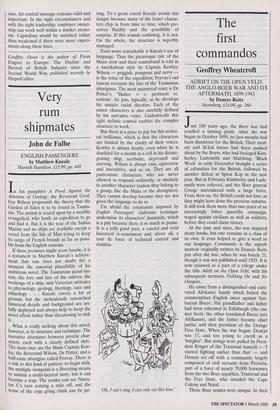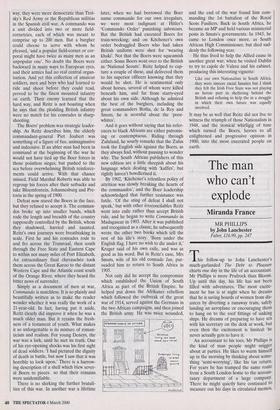The first commandos
Geoffrey VVheatcroft
ADRIFT ON THE OPEN VELD: THE ANGLO-BOER WAR AND ITS AFTERMATH, 1899-1943 by Deneys Reitz Stormberg, £14.99, pp. 560 Just 100 years ago, the Boer war had reached a turning point. After the war began in October 1899, its first months had been disastrous for the British. Their mod- est and ill-led forces had been pushed about by the Boers, who had besieged Kim- berley, Ladysmith and Mafeking. 'Black Week' in early December brought a series of calamities for the British, followed by another defeat at Spion Kop in the new year. But in February Kimberley and Lady- smith were relieved, and the Boer general Cronje surrendered with a large force. From then on, the British could not lose, as they might have done the previous autumn. It still took them more than two years of an increasingly bitter guerrilla campaign, waged against civilians as well as soldiers, before they could claim victory.
At the time and since, the war inspired many books, but one remains in a class of its own. It even helped to give a word to our language: Commando is the superb memoir originally written by Deneys Reitz just after the war, when he was barely 21, though it was not published until 1929. It is now reissued as a part of a trilogy under the title Adrift on the Open Veld, with his subsequent memoirs Trekking On and No Outspan.
He came from a distinguished and culti- vated Afrikaner family which belied the commonplace English sneer against 'bar- barous Boers'. His grandfather and father had been educated in Edinburgh (the one met Scott, the other translated Burns into Afrikaans), and the father became chief justice and then president of the Orange Free State. When the war began, Deneys was 17, and too young to enroll as a `burgher'. But strings were pulled by Presi- dent Kruger of the Transvaal himself — 'I started fighting earlier than that' — and Deneys set off with a commando largely composed of civil servants from Pretoria, part of a force of nearly 70,000 horsemen from the two Boer.republics, Transvaal and the Free State, who invaded the Cape Colony and Natal.
Those Boer armies were unique. In their way, they were more democratic than Trot- sky's Red Army or the Republican militias in the Spanish civil war. A commando was a unit divided into two or more field- cornetcies, each of which was meant to comprise up to 200 men. But a burgher could choose to serve with whom he pleased, 'and a popular field-cornet or cor- poral might have twice as many men as an unpopular one'. No doubt the Boers were backward in many ways to European eyes, and their armies had no real central organ- isation. And yet this collection of amateur soldiers, men and boys who had learned to ride and shoot before they could read, proved to be the finest mounted infantry on earth. Their enemy learned that the hard way, and Reitz is not boasting when he says that the plodding British infantry were no match for his comrades in sharp- shooting.
The Boers' problem was strategic leader- ship. As Reitz describes him, the elderly commandant-general Piet Joubert was something of a figure of fun, unimaginative and indecisive. If an abler man had been in command at the beginning of the war he would not have tied up the Boer forces in those pointless sieges, but pushed to the sea before overwhelming British reinforce- ments could arrive. With that chance missed, Field Marshal Roberts was able to regroup his forces after their setbacks and take Bloemfontein, Johannesburg and Pre- toria in the spring of 1900.
Defeat now stared the Boers in the face, but they refused to accept it. The comman- dos broke up into smaller bands, which rode the length and breadth of the country supposedly controlled by the British, whom they shadowed, harried and taunted. Reitz's own journeys were breathtaking in scale. First he and his comrades rode to and fro across the Transvaal, then south through the Free State and Eastern Cape to within not many miles of Port Elizabeth. An extraordinary final chevauchee took them across the Great Karoo to the distant Western Cape and the Atlantic coast south of the Orange River, where they heard the bitter news of surrender.
Simply as a document of men at war, Commando is matchless. It is so plainly and beautifully written as to make the reader wonder whether it was really the work of a 21-year-old. In fact, having put it aside, Reitz clearly did improve it when he was a much older man. But it retains the fresh- ness of a testament of youth. What makes it so unforgettable is its mixture of roman- ticism and realism. For young Deneys, the war was a lark, until he met its truth. One of his eye-opening shocks was his first sight of dead soldiers. had pictured the dignity of death in battle, but now I saw that it was horrible to look upon.' There is a harrow- ing description of a shell which blew sever- al Boers to pieces so that their remains were unidentifiable.
There is no shirking the further brutali- ties of this war. In another war a lifetime later, when we had borrowed the Boer name commando for our own irregulars, we were most indignant at Hitler's `Commando Order' punishing saboteurs. But the British had executed Boers for train-wrecking; and on Kitchener's own order bedraggled Boers who had taken British uniform were shot for 'wearing khaki'. Not that the Boers were squeamish either. Some Boers went over to the British as 'National Scouts'. Reitz helped to cap- ture a couple of these, and delivered them to his superior officers knowing that they would be shot. He is sentimental only about horses, several of whom were killed beneath him, and far from starry-eyed about his own side. Although he admired the best of the burghers, including the great commanders Botha, de la Rey and Smuts, he is scornful about the 'poor- whites'.
And it goes without saying that his refer- ences to black Africans are either patronis- ing or contemptuous. Riding through Zululand, he sourly remarks that the Zulus took the English side against the Boers, as they always had, without pausing to wonder why. The South African publishers of this new edition are a little sheepish about his language when dealing with laffirs', but rightly haven't bowdlerised it.
By 1902, `Kitchener's relentless policy of attrition was slowly breaking the hearts of the commandos', and the Boer leadership acknowledged that further resistance was futile. 'Of the sting of defeat I shall not speak,' but with other irreconcilables Reitz went into exile rather than accept British rule, and he began to write Commando in Madagascar in 1903. After it was published and recognised as a classic, he subsequently wrote the other two books which tell the rest of his life's story. 'Born under the English flag, I have no wish to die under it,' Kruger said of his own exile, and was as good as his word. But in Reitz's case, Mrs Smuts, wife of his old comrade Jan, pur- suaded him to return to South Africa in 1905.
Not only did he accept the compromise which established the Union of South Africa as part of the British Empire, he helped put down the Afrikaner rebellion which followed the outbreak of the great war of 1914, served against the Germans in the two African campaigns, and then joined the British army. He was twice wounded and the end of the war found him com- manding the 1st battalion of the Royal Scots Fusiliers. Back in South Africa, he became an MP and held various ministerial posts in Smuts's governments. In 1943, he came to London once more, as South African High Commissioner, but died sud- denly the following year.
He thus lived to help the Allied cause in another great war, when he visited Dublin to try to cajole de Valera and his cabinet, producing this interesting vignette:
Like our own Nationalists in South Africa, they were sincere racial fanatics but I think they felt the Irish Free State was not playing an heroic part in sheltering behind the British and refusing to help the in a struggle in which their own future was equally involved.
It may be as well that Reitz did not live to witness the triumph of those Nationalists in 1948, and the ironical whirligig of time which turned the Boers, heroes to all enlightened and progressive opinion in 1900, into the most execrated people on earth.



































































 Previous page
Previous page